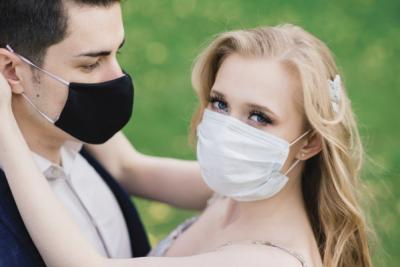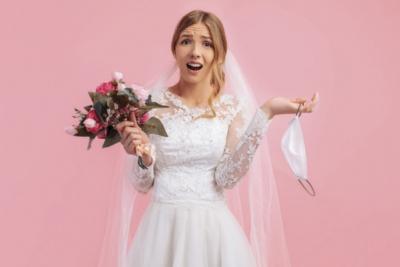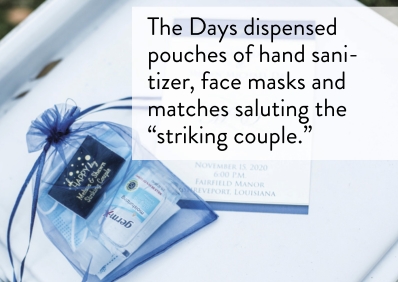Planning a wedding during a pandemic

Don’t want to wait to tie the knot? How to have a beautiful and safe wedding during COVID-19
 When planning a wedding, it’s smart to prepare for various worst-case scenarios, like bad weather or a ripped dress. Until this year, though, most couples didn’t have to consider a pandemic in their contingency plans.
When planning a wedding, it’s smart to prepare for various worst-case scenarios, like bad weather or a ripped dress. Until this year, though, most couples didn’t have to consider a pandemic in their contingency plans.
Despite how many things have been canceled this year thanks to COVID-19, love has not. In fact, according to the 2020 Brides American Wedding Study, 82% of respondents said that living through the pandemic has made them want to get married more.
So, with the end of the pandemic still uncertain, here are answers to some of the most common questions related to the coronavirus and weddings from industry professionals.
Should we postpone?
Unfortunately, to hold a wedding with all the bells and whistles, couples will most likely have to postpone until at least next fall. But, you wouldn’t be alone in putting off the big day. Over half of respondents (66%) to the Brides American Wedding Study said they chose to defer their 2020 nuptials.
Before deciding to wait, though, be sure to take a close look at any vendor contracts for fees related to date changes or cancellations.
In general, you will lose far less money by postponing instead of canceling. When you defer, it isn’t a flat loss for the business, so they view this more generously. Know that you may lose a few thousand, either way. “If you stand to lose more than 10K on a postponement, it may be better for you to downsize, according to local guidelines, and continue on with your date,” says Eva Clark, owner of Eva Clark Events, a destination wedding planning company. What planning can we do virtually?
 Luckily, if you don’t want to wait, there are plenty of steps you can take to move ahead with your wedding plans safely.
Luckily, if you don’t want to wait, there are plenty of steps you can take to move ahead with your wedding plans safely.
“This virus does not appear to be going anywhere, but with patience and proper planning, you can still plan the wedding of your dreams! Design meetings, quotes and even many of the venue walk-throughs can be done virtually with a variety of software options,” explains CeCe Todd, owner and principal designer at CeCe Designs and Events, an event and floral design company in Alabama.
How can we have a safe wedding?
The first consideration is the venue. While regulations related to COVID-19 vary from place to place, it’s best to choose a venue that adheres to the recommendations set out by the CDC. Ideally, that means an outdoor venue that allows guests to remain in socially distant pods throughout the event.
“The more accommodating the venue can be, the more effective the rest of the wedding professionals can be,” says Todd. “We have been able to successfully navigate food and beverage options by installing dividers between the food servers and the guests. Drinks cannot be refilled, but other than that, bar service has still been an option at most of our weddings.”
Another way couples can minimize the risk of spreading COVID-19 is by limiting their guest list. The smaller the wedding, the better. All in-person attendees should also wear masks at all times when not eating or drinking.
Also, consider hiring an experienced wedding planner if you have the budget.
“There has never been a greater need for a professional to act as your facilitator/ advocate than now. One never really knows how vital their planner is til something goes wrong,” advises Clark.
 How do we tell guests about changes?
How do we tell guests about changes?
One of the most important things for any couple trying to plan a wedding in a pandemic is to remain flexible. While that might mean disappointing loved ones when circumstances change, it’s best to be as transparent as possible.
“This year has shown that people can adapt and overcome when provided with enough information. Most guests have been very understanding of our couples adjusting guest counts, venue changes, wedding date changes and more,” says Todd. “The key is to remember that marrying the one you love is the most important part of the day.” Will the pandemic change weddings in the long term?
While not every impact of COVID-19 on weddings will last (i.e., masks, temperature scans, socially distant tables), some of the trends are bound to stick around for a bit. Live streaming the ceremony, for instance, can help loved ones who can’t attend still feel connected to the big day – even without a pandemic keeping them away.
“I believe that this has shown people that you can reduce the number of guests at your wedding without reducing the amount of beauty, laughter and love that accompanies the day,” adds Todd. “I believe that these smaller guest counts will continue, and I anticipate couples will spend the money saved from less guests on other amenities that they might have previously passed on like a videographer, vintage getaway car or live band.”
